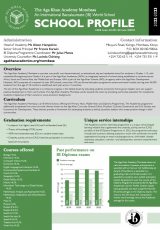Discrimination is Real
Over 40 students and faculty were involved in a whole-day workshop on discrimination held at AKA, Mombasa on 4 April 2006. Mr. Karumba, co-faculty advisor with Mr. Bardai, stated that the conference was organized to "sensitize youth to issues that affect society." The workshop began with an innovative exercise that placed some students in a position of feeling what it is like being categorized and excluded.
"It was totally unfair," stated Samantha, one of the students who was victimized. The debriefing illustrated that those who are in a position of comfort were less likely to accept responsibility and speak out against the injustice. This reflection paved the way for an interesting, widely-recognised discussion on racism.
During the period, the students watched a clip from the movie Crash which highlighted racist behaviour. The students were then given a chance to consider the racist acts and the impact of these behaviours. As the discussion progressed, Mrs. Khan, Mr. Dudi, Mr. Karumba and Mr. Serem introduced the topics of tribalism and gender discrimination. They emphasised the problem facing Kenya, allowing the students to truly understand the degrading effects of discrimination.
The students' experience continued with an intense movie, Hotel Rwanda—a story based on the gruesome war between two tribes. "Oh my God!" was the participants' only expression after watching parts of the movie. They, for the first time, had been introduced to barbaric, criminal acts of tribalism and hatred. The shock further developed their understanding of the threat of segregation.





